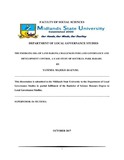Please use this identifier to cite or link to this item:
https://cris.library.msu.ac.zw//handle/11408/3947| Title: | The emerging era of Land Barons, challenges for land governance and development control. A case study of Southlea Park, Harare. | Authors: | Majogo, Tatenda | Keywords: | land barons land governance development control |
Issue Date: | 2017 | Publisher: | Midlands State University | Abstract: | The research main aim was to investigate the reasons behind the emergence of land barons and their implications for land governance and development, in Harare Southlea Park. The objectives of the study include finding out the major reasons behind the emergence of land barons, and to identify their implications on both land governance and development control. Literature was reviewed in the context of journals, text books and internet sources and analyzed in the background of research objectives. The researcher used a case study research design in carrying out the research and used a sample size of 40 respondents from Harare City Council’s: Housing Department employees and Southlea Park residents. Purposive/judgmental sampling technique was used to select council employee’s respondents and convenience sampling technique used to select housing cooperative members of Southlea Park respondents. Interviews and questionnaires were used as research instruments. Data collected was presented, interpreted and analyzed through use of graphs, tables and pie charts. The overall response rate from the interviews and questionnaires was 70%. The major findings of the study reviewed the reasons behind the rise of land barons and these include abuse of the Land Reform Programme (2000) by politicians, urbanization as a result of rural-urban migration, corruption and poor town planning. Implications of land barons on land governance and development control also composed the major findings and these include disruption of the water table, disorder, land ownership disputes among others. Recommendations were made by the researcher to combat the land baron crisis and these include fulfillment by the government of Zimbabwe of the 2014 Harare charter of the National Housing Delivery Programme under the ZIM-ASSET that will see Harare province delivering 105 935 houses by 2108 to reduce the council housing backlog, harsh penalties and removal from office politicians abusing land gained through the LRP (2000), distributing it to party followers to gain political mileage so as to discourage such unethical practices amongst corrupt politicians, capacitating the HCC to service land for housing and provision of supplementary land to the Harare City Council for housing service provision so as to reduce the housing backlog which is being exploited by land barons. | URI: | http://hdl.handle.net/11408/3947 |
| Appears in Collections: | Bsc Local Governance Studies Honours Degree |
Files in This Item:
| File | Description | Size | Format | |
|---|---|---|---|---|
| Tatenda Majogo.pdf | Full Text | 797.36 kB | Adobe PDF |  View/Open |
Page view(s)
466
checked on Feb 14, 2026
Download(s)
314
checked on Feb 14, 2026
Google ScholarTM
Check
Items in MSUIR are protected by copyright, with all rights reserved, unless otherwise indicated.



